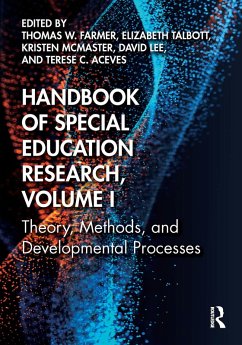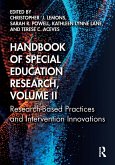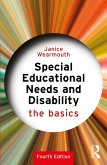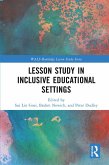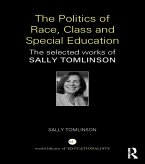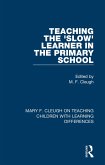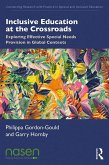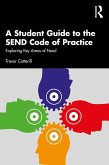Handbook of Special Education Research, Volume I (eBook, PDF)
Theory, Methods, and Developmental Processes
Redaktion: Farmer, Thomas W.; Aceves, Terese C.; Lee, David; Mcmaster, Kristen; Talbott, Elizabeth
121,95 €
121,95 €
inkl. MwSt.
Sofort per Download lieferbar

61 °P sammeln
121,95 €
Als Download kaufen

121,95 €
inkl. MwSt.
Sofort per Download lieferbar

61 °P sammeln
Jetzt verschenken
Alle Infos zum eBook verschenken
121,95 €
inkl. MwSt.
Sofort per Download lieferbar
Alle Infos zum eBook verschenken

61 °P sammeln
Handbook of Special Education Research, Volume I (eBook, PDF)
Theory, Methods, and Developmental Processes
Redaktion: Farmer, Thomas W.; Aceves, Terese C.; Lee, David; Mcmaster, Kristen; Talbott, Elizabeth
- Format: PDF
- Merkliste
- Auf die Merkliste
- Bewerten Bewerten
- Teilen
- Produkt teilen
- Produkterinnerung
- Produkterinnerung

Bitte loggen Sie sich zunächst in Ihr Kundenkonto ein oder registrieren Sie sich bei
bücher.de, um das eBook-Abo tolino select nutzen zu können.
Hier können Sie sich einloggen
Hier können Sie sich einloggen
Sie sind bereits eingeloggt. Klicken Sie auf 2. tolino select Abo, um fortzufahren.

Bitte loggen Sie sich zunächst in Ihr Kundenkonto ein oder registrieren Sie sich bei bücher.de, um das eBook-Abo tolino select nutzen zu können.
Divided into two volumes, Handbook of Special Education Research provides a comprehensive overview of critical issues in special education research. Essential reading for researchers and students of special education, this handbook brings together diverse and complementary perspectives to help move the field forward.
- Geräte: PC
- ohne Kopierschutz
- eBook Hilfe
- Größe: 6.56MB
Andere Kunden interessierten sich auch für
![Handbook of Special Education Research, Volume II (eBook, PDF) Handbook of Special Education Research, Volume II (eBook, PDF)]() Handbook of Special Education Research, Volume II (eBook, PDF)121,95 €
Handbook of Special Education Research, Volume II (eBook, PDF)121,95 €![Special Educational Needs and Disability (eBook, PDF) Special Educational Needs and Disability (eBook, PDF)]() Janice WearmouthSpecial Educational Needs and Disability (eBook, PDF)21,95 €
Janice WearmouthSpecial Educational Needs and Disability (eBook, PDF)21,95 €![Lesson Study in Inclusive Educational Settings (eBook, PDF) Lesson Study in Inclusive Educational Settings (eBook, PDF)]() Lesson Study in Inclusive Educational Settings (eBook, PDF)39,95 €
Lesson Study in Inclusive Educational Settings (eBook, PDF)39,95 €![The Politics of Race, Class and Special Education (eBook, PDF) The Politics of Race, Class and Special Education (eBook, PDF)]() Sally TomlinsonThe Politics of Race, Class and Special Education (eBook, PDF)60,95 €
Sally TomlinsonThe Politics of Race, Class and Special Education (eBook, PDF)60,95 €![Teaching the 'Slow' Learner in the Primary School (eBook, PDF) Teaching the 'Slow' Learner in the Primary School (eBook, PDF)]() Teaching the 'Slow' Learner in the Primary School (eBook, PDF)31,95 €
Teaching the 'Slow' Learner in the Primary School (eBook, PDF)31,95 €![Inclusive Education at the Crossroads (eBook, PDF) Inclusive Education at the Crossroads (eBook, PDF)]() Philippa Gordon-GouldInclusive Education at the Crossroads (eBook, PDF)30,95 €
Philippa Gordon-GouldInclusive Education at the Crossroads (eBook, PDF)30,95 €![A Student Guide to the SEND Code of Practice (eBook, PDF) A Student Guide to the SEND Code of Practice (eBook, PDF)]() Trevor CotterillA Student Guide to the SEND Code of Practice (eBook, PDF)31,95 €
Trevor CotterillA Student Guide to the SEND Code of Practice (eBook, PDF)31,95 €-
-
-
Divided into two volumes, Handbook of Special Education Research provides a comprehensive overview of critical issues in special education research. Essential reading for researchers and students of special education, this handbook brings together diverse and complementary perspectives to help move the field forward.
Dieser Download kann aus rechtlichen Gründen nur mit Rechnungsadresse in A, B, BG, CY, CZ, D, DK, EW, E, FIN, F, GR, HR, H, IRL, I, LT, L, LR, M, NL, PL, P, R, S, SLO, SK ausgeliefert werden.
Produktdetails
- Produktdetails
- Verlag: Taylor & Francis eBooks
- Seitenzahl: 386
- Erscheinungstermin: 10. Mai 2022
- Englisch
- ISBN-13: 9781000579826
- Artikelnr.: 63617088
- Verlag: Taylor & Francis eBooks
- Seitenzahl: 386
- Erscheinungstermin: 10. Mai 2022
- Englisch
- ISBN-13: 9781000579826
- Artikelnr.: 63617088
- Herstellerkennzeichnung Die Herstellerinformationen sind derzeit nicht verfügbar.
Thomas W. Farmer is Professor at the University of Pittsburgh, USA. Elizabeth Talbott is Professor and Associate Dean for Research and Faculty Development at William & Mary, USA. Kristen McMaster is Professor and Chair of the Department of Educational Psychology at the University of Minnesota, USA. David Lee is Professor of Education at Pennsylvania State University, USA. Terese C. Aceves is Professor in the School of Education at Loyola Marymount University, USA.
Section 1: Theoretical Foundations Of Special Education Research 1. Taking
Stock of Special Education Research: Current Perspectives and Future
Directions 2. Theoretical Foundations of Applied Behavior Analysis and
Applications in Special Education Research and Practice 3. Contributions of
Cognitive Science to Special Education Research and Practice: Historical
Context, Current Influences and Future Directions 4. Using Data I\in
Research and Practice: Intensifying and Strengthening the Effectiveness of
Academic Instruction 5. Examining Common Theoretical Orientations to
Family-School Partnership Research in Special Education to Promote Equity
6. Developmental Science and Special Education Research: Dynamic Systems,
Person-In-Context, and Lifecourse Perspectives Section 2: Methods, Design,
And Analysis In Special Education Research 7. Examining Critical Issues in
Special Education Using Single-Case Research Methods 8. Group Experimental
Designs for Validating Interventions for Students With Disabilities 9.
Identifying Effective Classroom and School Practices Using
Cluster-Randomized Designs 10. Parents as Primary Participants: Key
Methodological Considerations for Including the Parent Voice in Research
11. Beyond Cultural Responsivity: Applied Behavior Analysis Through a Lens
of Cultural Humility 12. Moderation and Mediation: Examining Individual
Differences in Special Education 13. Qualitative Research 14. Mixed Methods
15. Implementation Science in Special Education: Progress and Promise 16.
Open Science And Replication In Special Education Research 17. Making Sense
of Multiple Data Sources: Using Single Case Research Design for Behavioral
Decision-Making 18. Longitudinal Research to Support Tailored Intervention:
Person and Process Oriented Analyses Section 3: Leveraging Developmental
Processes And Contexts In Intervention 19. Developmental Distinctions in
Mathematics for Students with Disabilities 20. The Development of Reading
Comprehension in Adolescents with Literacy Difficulties 21. Self-Regulation
and Executive Function: The Foundation for Student Success 22.
Underrepresented Students within Gifted and Talented Education 23. Family
As Faculty: Centering Families' Expertise for the Benefit of Youth with
Disabilities 24. Culturally Adapted Behavioral Strategies for Educators 25.
The Role of Classroom Social Dynamics in Students with Exceptionalities'
Involvement in Peer Victimization 26. Tiered Systems of Adaptive Support:
Linking Practice Elements of Evidenced-Based Programs to Developmental
Processes and Classroom Contexts
Stock of Special Education Research: Current Perspectives and Future
Directions 2. Theoretical Foundations of Applied Behavior Analysis and
Applications in Special Education Research and Practice 3. Contributions of
Cognitive Science to Special Education Research and Practice: Historical
Context, Current Influences and Future Directions 4. Using Data I\in
Research and Practice: Intensifying and Strengthening the Effectiveness of
Academic Instruction 5. Examining Common Theoretical Orientations to
Family-School Partnership Research in Special Education to Promote Equity
6. Developmental Science and Special Education Research: Dynamic Systems,
Person-In-Context, and Lifecourse Perspectives Section 2: Methods, Design,
And Analysis In Special Education Research 7. Examining Critical Issues in
Special Education Using Single-Case Research Methods 8. Group Experimental
Designs for Validating Interventions for Students With Disabilities 9.
Identifying Effective Classroom and School Practices Using
Cluster-Randomized Designs 10. Parents as Primary Participants: Key
Methodological Considerations for Including the Parent Voice in Research
11. Beyond Cultural Responsivity: Applied Behavior Analysis Through a Lens
of Cultural Humility 12. Moderation and Mediation: Examining Individual
Differences in Special Education 13. Qualitative Research 14. Mixed Methods
15. Implementation Science in Special Education: Progress and Promise 16.
Open Science And Replication In Special Education Research 17. Making Sense
of Multiple Data Sources: Using Single Case Research Design for Behavioral
Decision-Making 18. Longitudinal Research to Support Tailored Intervention:
Person and Process Oriented Analyses Section 3: Leveraging Developmental
Processes And Contexts In Intervention 19. Developmental Distinctions in
Mathematics for Students with Disabilities 20. The Development of Reading
Comprehension in Adolescents with Literacy Difficulties 21. Self-Regulation
and Executive Function: The Foundation for Student Success 22.
Underrepresented Students within Gifted and Talented Education 23. Family
As Faculty: Centering Families' Expertise for the Benefit of Youth with
Disabilities 24. Culturally Adapted Behavioral Strategies for Educators 25.
The Role of Classroom Social Dynamics in Students with Exceptionalities'
Involvement in Peer Victimization 26. Tiered Systems of Adaptive Support:
Linking Practice Elements of Evidenced-Based Programs to Developmental
Processes and Classroom Contexts
Section 1: Theoretical Foundations Of Special Education Research 1. Taking
Stock of Special Education Research: Current Perspectives and Future
Directions 2. Theoretical Foundations of Applied Behavior Analysis and
Applications in Special Education Research and Practice 3. Contributions of
Cognitive Science to Special Education Research and Practice: Historical
Context, Current Influences and Future Directions 4. Using Data I\in
Research and Practice: Intensifying and Strengthening the Effectiveness of
Academic Instruction 5. Examining Common Theoretical Orientations to
Family-School Partnership Research in Special Education to Promote Equity
6. Developmental Science and Special Education Research: Dynamic Systems,
Person-In-Context, and Lifecourse Perspectives Section 2: Methods, Design,
And Analysis In Special Education Research 7. Examining Critical Issues in
Special Education Using Single-Case Research Methods 8. Group Experimental
Designs for Validating Interventions for Students With Disabilities 9.
Identifying Effective Classroom and School Practices Using
Cluster-Randomized Designs 10. Parents as Primary Participants: Key
Methodological Considerations for Including the Parent Voice in Research
11. Beyond Cultural Responsivity: Applied Behavior Analysis Through a Lens
of Cultural Humility 12. Moderation and Mediation: Examining Individual
Differences in Special Education 13. Qualitative Research 14. Mixed Methods
15. Implementation Science in Special Education: Progress and Promise 16.
Open Science And Replication In Special Education Research 17. Making Sense
of Multiple Data Sources: Using Single Case Research Design for Behavioral
Decision-Making 18. Longitudinal Research to Support Tailored Intervention:
Person and Process Oriented Analyses Section 3: Leveraging Developmental
Processes And Contexts In Intervention 19. Developmental Distinctions in
Mathematics for Students with Disabilities 20. The Development of Reading
Comprehension in Adolescents with Literacy Difficulties 21. Self-Regulation
and Executive Function: The Foundation for Student Success 22.
Underrepresented Students within Gifted and Talented Education 23. Family
As Faculty: Centering Families' Expertise for the Benefit of Youth with
Disabilities 24. Culturally Adapted Behavioral Strategies for Educators 25.
The Role of Classroom Social Dynamics in Students with Exceptionalities'
Involvement in Peer Victimization 26. Tiered Systems of Adaptive Support:
Linking Practice Elements of Evidenced-Based Programs to Developmental
Processes and Classroom Contexts
Stock of Special Education Research: Current Perspectives and Future
Directions 2. Theoretical Foundations of Applied Behavior Analysis and
Applications in Special Education Research and Practice 3. Contributions of
Cognitive Science to Special Education Research and Practice: Historical
Context, Current Influences and Future Directions 4. Using Data I\in
Research and Practice: Intensifying and Strengthening the Effectiveness of
Academic Instruction 5. Examining Common Theoretical Orientations to
Family-School Partnership Research in Special Education to Promote Equity
6. Developmental Science and Special Education Research: Dynamic Systems,
Person-In-Context, and Lifecourse Perspectives Section 2: Methods, Design,
And Analysis In Special Education Research 7. Examining Critical Issues in
Special Education Using Single-Case Research Methods 8. Group Experimental
Designs for Validating Interventions for Students With Disabilities 9.
Identifying Effective Classroom and School Practices Using
Cluster-Randomized Designs 10. Parents as Primary Participants: Key
Methodological Considerations for Including the Parent Voice in Research
11. Beyond Cultural Responsivity: Applied Behavior Analysis Through a Lens
of Cultural Humility 12. Moderation and Mediation: Examining Individual
Differences in Special Education 13. Qualitative Research 14. Mixed Methods
15. Implementation Science in Special Education: Progress and Promise 16.
Open Science And Replication In Special Education Research 17. Making Sense
of Multiple Data Sources: Using Single Case Research Design for Behavioral
Decision-Making 18. Longitudinal Research to Support Tailored Intervention:
Person and Process Oriented Analyses Section 3: Leveraging Developmental
Processes And Contexts In Intervention 19. Developmental Distinctions in
Mathematics for Students with Disabilities 20. The Development of Reading
Comprehension in Adolescents with Literacy Difficulties 21. Self-Regulation
and Executive Function: The Foundation for Student Success 22.
Underrepresented Students within Gifted and Talented Education 23. Family
As Faculty: Centering Families' Expertise for the Benefit of Youth with
Disabilities 24. Culturally Adapted Behavioral Strategies for Educators 25.
The Role of Classroom Social Dynamics in Students with Exceptionalities'
Involvement in Peer Victimization 26. Tiered Systems of Adaptive Support:
Linking Practice Elements of Evidenced-Based Programs to Developmental
Processes and Classroom Contexts
